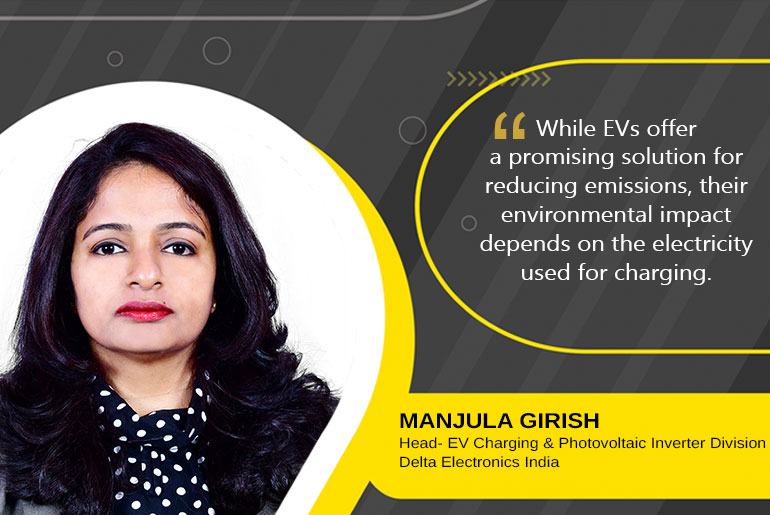Introduction
The electric vehicle (EV) revolution is gaining momentum worldwide, driven by a growing focus on environmental responsibility. At Delta Electronics India, we’re at the forefront of this transformation. We recognize the critical role of integrating EV charging infrastructure with renewable energy sources, creating a truly sustainable transportation ecosystem.
Why Renewable Energy Matters
While EVs offer a promising solution for reducing emissions, their environmental impact depends on the electricity used for charging. Integrating renewable energy sources like solar and wind power is crucial. This approach not only minimizes greenhouse gas emissions by replacing fossil fuel-based electricity, but also improves air quality by reducing harmful pollutants. Additionally, renewable energy offers long-term cost savings for charging station operators and enhances grid resilience. As EVs proliferate, wind and solar energy are among the fastest-growing technologies, projected to meet over 35% of the electricity demand by 2050. This shift towards renewables paves the way for reliable, cost-effective energy security, supporting strong socioeconomic growth and ensuring universal access to clean power.
Urgency for Sustainable EV Charging
The rapid adoption of EVs offers a promising path towards a cleaner future. However, their environmental impact hinges on the source of charging electricity. Electric vehicles efficiently convert 60% of the electrical energy from the grid to power the wheels, compared to the significant energy waste of gasoline or diesel vehicles. While EVs themselves have zero tailpipe emissions, even accounting for electricity generation, they emit significantly less carbon dioxide than gasoline or diesel vehicles. Here’s a closer look at the environmental benefits of integrating renewable energy with EV charging:
Reduced Carbon Footprint: By utilizing renewable energy sources like solar and wind, EV charging significantly reduces reliance on fossil fuels and minimizes greenhouse gas emissions. A study by the NREL estimates that pairing solar power with EV charging can achieve a carbon footprint reduction of up to 70% compared to grid-based charging.
Cleaner Air Quality: Transitioning to renewable energy for EV charging reduces emissions of pollutants like nitrogen oxides and particulate matter, leading to cleaner air and improved public health.
Beyond Environmental Benefits: A Sustainable Charging Ecosystem
The integration of renewable energy presents not just environmental but also economic advantages:
Reduced Operational Costs: Renewable energy sources offer long-term cost savings on electricity bills for EV charging station operators. The upfront investment in solar panels or wind turbines can be offset by the significant reduction in reliance on the grid over time.
Grid Independence and Resilience: EV charging stations powered by renewable energy sources become less susceptible to fluctuations or outages in the grid, enhancing overall system stability and resilience.
Increased Revenue Potential: Offering green charging options can attract environmentally conscious consumers, leading to increased revenue streams for charging station operators.
Government Incentives: Many governments are offering subsidies and tax breaks to promote the adoption of renewable energy for EV charging infrastructure.
Challenges and Opportunities on the Road Ahead
Despite the compelling benefits, certain challenges exist in integrating renewable energy and EV charging:
Intermittent Energy Sources: Solar and wind energy are inherently variable, requiring energy storage solutions like batteries to ensure consistent power delivery for EV charging.
Grid Integration Challenges: Integrating large-scale renewable energy sources with existing grid infrastructure can require upgrades and modernization efforts.
Initial Investment Costs: The upfront cost of installing solar panels, wind turbines, and energy storage systems can be substantial, although these costs are steadily decreasing with technological advancements.
The Way Forward: A Collaborative Approach
The successful integration of renewables with EV charging requires a collaborative approach involving various stakeholders:
Government Agencies: Governments can play a crucial role by enacting policies that incentivize renewable energy adoption for EV charging infrastructure. Streamlining regulations and providing financial support can significantly accelerate widespread implementation.
Utilities: Collaboration between utilities and EV charging station operators is essential to ensure grid stability and efficient integration of renewable energy sources.
Technology Providers: Companies like Delta Electronics India have a responsibility to develop innovative and cost-effective solutions for integrating renewables with EV charging.
A Brighter, Sustainable Future for Mobility
By integrating EV charging infrastructure with renewable energy sources, we can create a cleaner, more sustainable future for transportation. With collaborative efforts and technological advancements, we can overcome the challenges and unlock the vast potential of this approach. At Delta Electronics India, we are committed to playing a leading role in this transformation, paving the way for a future where electric vehicles are powered by clean, renewable energy.

